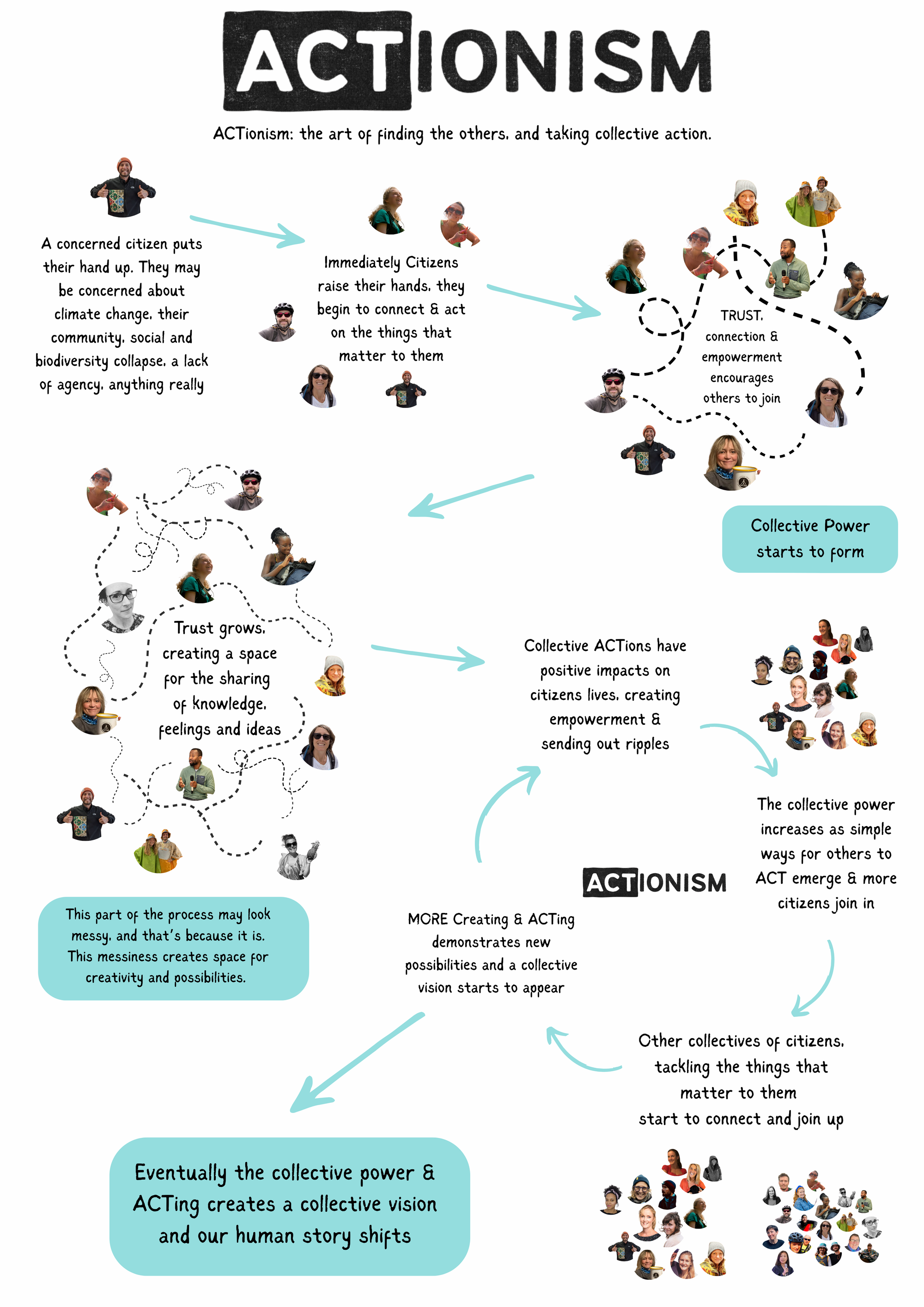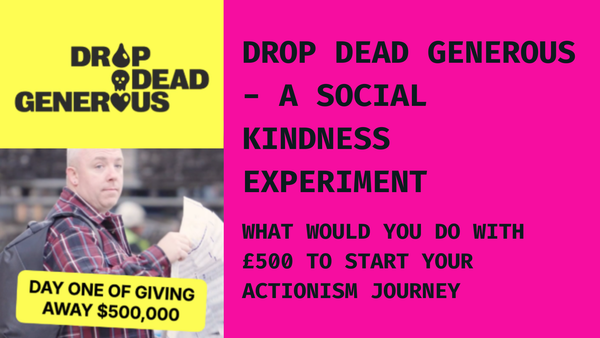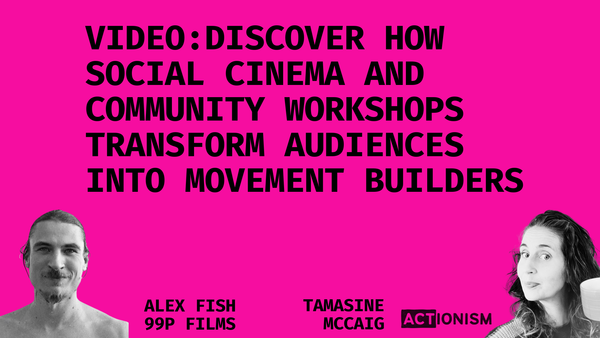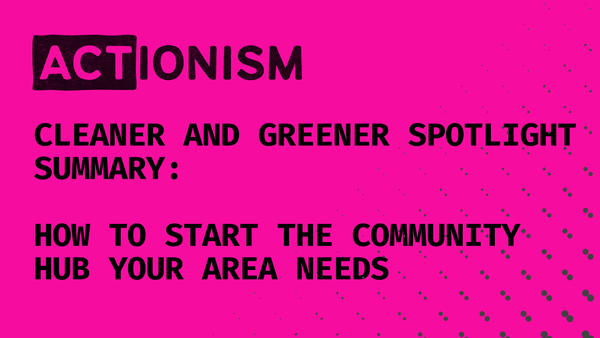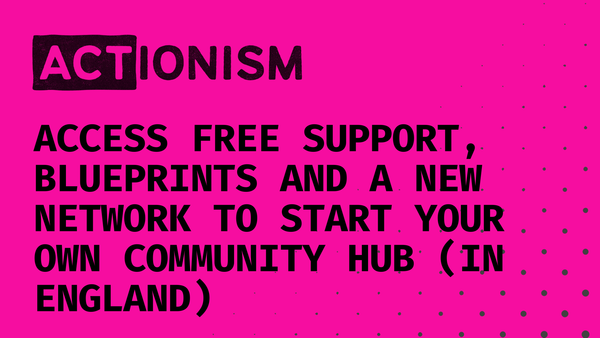Finding the Escape Hatch
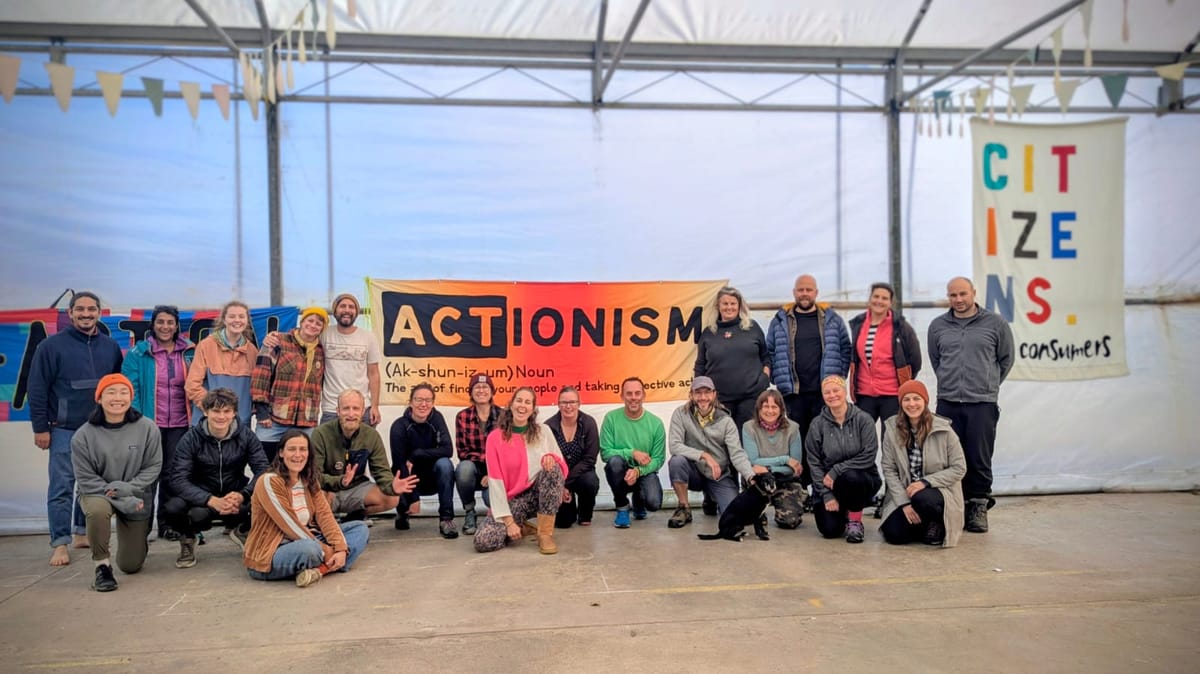
Olivia recently returned to the core of the ACTionism community, after a short time away working on Citizens’ Assemblies, exploring fairness, politicians’ pay, and what it means to value public service, vital work. And now she's back to do something just as important: the work of reimagining belonging, care, and culture through Actionism.
She’s joined Tamasine and me on a journey, one with no clear destination, only a shared commitment to learning, feeling, and doing things differently in the world.
And I’m deeply grateful. Not just because Olivia is an amazing citizen and writer. But, because Olivia has this gift, she knows how to name the truth of a moment. She did it beautifully in the first Learning to Love Where We Live blog, a series that isn’t just about geography or home, but about loving ourselves, each other, the land beneath us, the bodies we inhabit, and the communities we are part of.
This weekend I've been reflecting. Because she’s right: the consumer story we’ve all been living inside has stripped us of something essential, our capacity to love. Love for ourselves. For our neighbours. For the more-than-human world. It hasn’t just made us consumers, I think it’s us who’ve been consumed. We have lost the very essence of our being.
Instagram is where we now market ourselves. Where life is broken into fragments, filtered and uploaded for likes. And over time, that logic, what performs, what sells, what scales, what goes viral, has seeped into everything. Our culture, our politics, our sense of place, even our ideas about nationhood.
So it’s no wonder we feel something is missing. Not just personally, but collectively. Identity feels hollow when it’s built around consumption. And we see the effects everywhere: our high streets stripped of character, replaced by the cold efficiency of Starbucks. Our public services and safety nets auctioned off. Our values reshaped by ownership and isolation. Our relationship with nature reduced to supply chains, the food on our plates severed from the soil it came from. The suffering of the more-than-human world hidden beneath plastic packaging and marketing slogans. Community spaces closed in the name of efficiency. Connection replaced by convenience.
As Olivia describes, it’s no surprise that sometimes we feel the urge to reach for the escape hatch.
“That weird, wonderful urge, seemingly shared by a lot of young(ish) folks, that there's always the option of selling all your belongings, shaving your head, and moving to South America to experience true spiritual connection and discover the meaning of life.”
But here’s the thing: even these escape fantasies are still part of the same story. The one that centres the individual. The idea that if you just go far enough, cleanse deeply enough, or curate your life beautifully enough, you’ll finally be free.
But this is the same logic, just in different clothes. Still chasing freedom through individual action. Still trying to outrun the system. And it doesn’t work.
Because, our ecological, social, and economic systems are in collapse. And there is no safety hatch that takes us away from that. There is no individual happiness without collective agency. No private peace in a world at war. No liberation that leaves others behind.
So maybe the real question isn’t where can we run, but what can we face?
What if, instead of trying to escape to somewhere that will never deliver what we truly need, we stayed and learned to love where we live? Faced truths with commitment and courage?
Because if the human story is to continue, it won’t be because we ran. It will be because we stayed. Because we repaired, and found love, together.
Reimagining Value
Over the weekend, I came across a quote, one you’ve probably seen before:
“The most environmentally friendly product is the one you didn’t buy.”
And, honestly, I am not a fan. Not because it's entirely wrong, there’s truth in it. But it doesn’t go deep enough, it doesn't tell the whole story.
Because the most environmentally friendly product might be the one you didn’t buy, but more often, it’s the one you loved. The one you borrowed from a friend. The one you shared through your local library of things. The one you fixed at the repair café with a stranger who became a mate. It’s the item you swapped at a community event, giving it a second story, and someone else, joy. The one you mended, patched, or repurposed with your own hands, proudly, visibly, creatively.
It’s the coat with the stitched elbow that started a conversation. The lamp you rewired instead of replacing, supporting a local tradesperson. The chair you painted rather than tossing, now unique and full of your character. The phone you kept for five years, not five months, reducing e-waste in your local area, supporting repair shops on your high street, and demonstrating that longevity is a form of respect for both people and planet.
It's the boots you re-soled so you could get back outside and reconnect with nature. The jeans you embroidered. The toaster you took apart, just to learn how it works.
It’s the product that sparked a connection, taught a skill, and inspired someone else to do the same.
It’s the one that didn’t just avoid waste, it built community, strengthened resilience, and reimagined value.
What has any of this got to do with escape hatches, loving where we live, and Englishness?
Everything.
Because the consumer story teaches us to throw away what’s broken. It severs our relationship with the earth, its resources, and our things. It says we are alone, that progress is winning, that value is ownership.
But it could be different. When Olivia speaks about learning to love the places we live, I think about loving the things in our lives, too. Not just because it makes sense, but because it unlocks a door to another world.
Here is the real escape hatch, not the fantasy of a life elsewhere, but a practice of re-connection. In the jacket you repaired. In the shelf you fixed. In the neighbour you shared with. In the joy of mending what once seemed disposable.
That’s how it began for me. My escape hatch started with a jacket that needed a zip repair. That jacket became a community space, that space became a global network, and that network became a movement.
A movement where we, as citizens, work together to escape not the world, but this story. A movement from consumption to connection, from isolation to belonging, from despair to action.
It’s a messy, complicated space. But it’s also full of joy, love, and possibility. Where once the consumer story closed us down, this space once again opens us back up. It gives us back our humanity. And maybe, just maybe, our future too.
My escape hatch doesn’t take me away, it keeps me right where I am, and it teaches me love.
But what’s any of this got to do with Englishness?
A lot.
Because just like identity, our idea of Englishness has been hollowed out by the same consumer logic. It’s been sold back to us in fragments, Union Jacks, wartime nostalgia, closed borders, fear of the ‘other’. A kind of branding exercise that turns belonging into exclusion.
Olivia wrote,
“And yet. What if we could reclaim the idea of being rooted without being exclusionary? What if loving where you live meant caring for all the beings who live there, human and more-than-human? What if Englishness could be about ancient woodlands and chalk streams and the right to roam, rather than about walls and borders and keeping people out? What if we tried to tune back into the wisdom of the wild places? What if we actually grappled with our colonial past and met it head on, using the collective reckoning as an opportunity to move forward into something collectively reimagined?”
And here’s the truth: that version of Englishness, rooted, generous, reimagined, won’t be delivered by GDP. It won’t come from a budget line, a border policy, or another cycle of growth, we won't consume it into existence. You can’t measure it in quarterly returns or vote for it in a general election.
It will emerge form a different place. It will come citizens.
Ellie shared a beautiful piece of her writing this weekend that contained the following quote:
“Transformation doesn’t crash through like a storm — It unfurls, soft and certain, like trees learning the language of light.”
Transformation cannot come from the same story that holds us in a headlock, it cannot be found in consuming more. To write a new story we must, find the cracks in the canopy, search for the light and write together, with creativity, love and joy.
And, that’s what is happening now, in quiet corners, in repair cafés, in community hubs, in borrowed tools, and shared meals. Across citizens’ collectives, around fire circles and repair tables, through watching starling murmurations, in the facing of our history, and in reconnection through the laying of our bodies on land.
It’s being written in the small actions and the stories we choose to tell each other. Written by Olivia, and others, that are learning to love where they live. This is where Englishness will be reimagined, not as exclusion, but as care. Not as consumers, as creative, with love.
It will be written through ACTionism: the art of finding the others and taking collective action.
And here’s the thing: these escape hatches from the old story? They’re everywhere.
In loving what you already have, in lying on the ground and really listening, in small-local acts of care that ripple outwards.
But most of all, they’re found in showing up, for your community, for each other, again and again.
We’ve found the escape hatches.
But there’s just one catch.
We can only open the master one if we choose to act, together.
